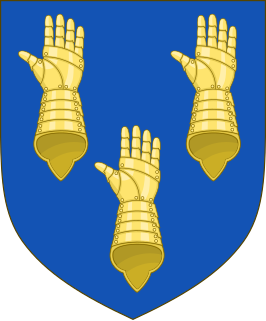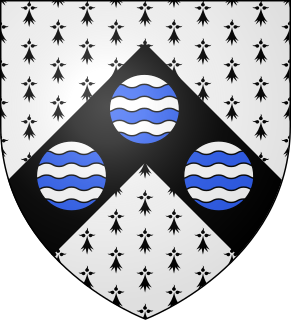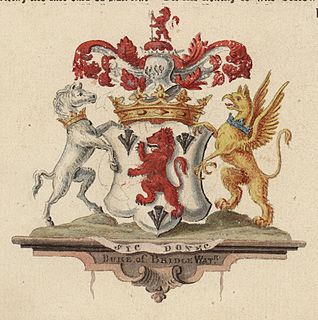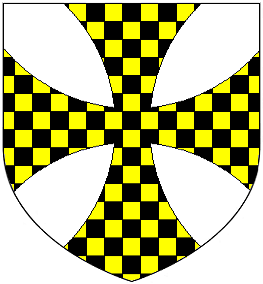
Baron Barnard, of Barnard Castle in the Bishopric of Durham, is a title in the Peerage of England. It was created in 1698 for Christopher Vane, who had previously served as a member of parliament for County Durham and Boroughbridge. Vane was the son of Sir Henry Vane the Younger and grandson of Sir Henry Vane the Elder. His grandson, the third Baron, notably served as Paymaster of the Forces and as Lord Lieutenant of County Durham. In 1754 he was created Viscount Barnard and Earl of Darlington, both in the County Palatine of Durham. Lord Darlington was the husband of Lady Grace FitzRoy, daughter of Charles FitzRoy, 2nd Duke of Cleveland, the illegitimate son of King Charles II by his mistress Barbara Villiers, 1st Duchess of Cleveland.

Baron Berners is a barony created by writ in the Peerage of England.

Earl of Kingston is a title in the Peerage of Ireland. It was created in 1768 for Edward King, 1st Viscount Kingston. The Earl holds the subsidiary titles Baron Kingston, of Rockingham in the County of Roscommon, Viscount Kingston, of Kingsborough in the County of Sligo, Baron Erris, of Boyle in the County of Roscommon, and Viscount Lorton, of Boyle in the County of Roscommon, also in the Peerage of Ireland. He is also a baronet in the Baronetage of Ireland. Between 1821 and 1869 the earls also held the title Baron Kingston, of Mitchelstown in the County of Cork, in the Peerage of the United Kingdom.
Earl of Bradford is a title that has been created twice, once in the Peerage of England and once in the Peerage of the United Kingdom. It was first created in 1694 for Francis Newport, 2nd Baron Newport. However, all the Newport titles became extinct on the death of the fourth Earl in 1762. The earldom was revived in 1815 for Orlando Bridgeman, 2nd Baron Bradford. The Bridgeman family had previously succeeded to the Newport estates. The title of the peerage refers to the ancient hundred of Bradford in Shropshire, and not, as might be assumed, to the city of Bradford, Yorkshire, or the town of Bradford-on-Avon in Wiltshire.

Viscount Hill, of Hawkstone and of Hardwicke in the County of Salop, is a title in the Peerage of the United Kingdom. It was created in 1842 for General Rowland Hill. He had already been created Baron Hill, of Almaraz and of Hawkstone in the County of Salop, in 1814, with remainder to the heirs male of his body, and Baron Hill, of Almarez and of Hawkestone and Hardwicke in the County of Salop, in 1816, with remainder to the heirs male of his elder brother John Hill. The viscountcy was created with the same special remainder. On the first Viscount's death in 1842, the barony of 1814 became extinct as he had no male issue, while he was succeeded in the barony of 1816 and the Viscountcy according to the special remainders by his nephew Sir Rowland Hill, 4th Baronet. His son, the 3rd Viscount, sat as a Conservative Member of Parliament for Shropshire North. In 1875, he assumed by Royal licence the additional surname of Clegg, which was that of his maternal grandfather. He inherited financial problems from his father which led to the breakup and sale of the family estates.

Baron Brownlow, of Belton in the County of Lincoln, is a title in the Peerage of Great Britain. It was created in 1776 for Sir Brownlow Cust, 4th Baronet. The Cust family descends from Richard Cust (1622-1700) of The Black Friars, Stamford, who represented Lincolnshire and Stamford in Parliament. In 1677 he was created a baronet, "of Stamford in the County of Lincoln". He was succeeded by his grandson Richard Cust, 2nd Baronet, who married Anne Brownlow, daughter of Sir William Brownlow, 4th Baronet, "of Humby", Lincolnshire, and sister and sole heiress of John Brownlow, 1st Viscount Tyrconnel, 5th Baronet of Belton House, Lincolnshire. The 2nd Baronet's son Sir John Cust, 3rd Baronet, sat as a Member of Parliament for Grantham and served as Speaker of the House of Commons from 1761 to 1770 and in 1754 inherited the Brownlow estates, including Belton, on the death of his childless maternal uncle Viscount Tyrconnel. His son Brownlow Cust, 4th Baronet represented Ilchester, Somerset, and Grantham in Parliament and in 1776 was raised to the peerage as Baron Brownlow, "of Belton in the County of Lincoln", chiefly in recognition of his father's services. He was succeeded by his son John Cust, 2nd Baron Brownlow who had sat as a Member of Parliament for Clitheroe, Lancashire, and also served as Lord Lieutenant of Lincolnshire for many years. In 1815 he was created Viscount Alford, "in the County of Lincoln" and Earl Brownlow both in the Peerage of the United Kingdom. In 1810 the future 1st Earl had married Sophia Hume, a daughter of Sir Abraham Hume, 2nd Baronet, of Wormleybury, by his wife Lady Amelia Egerton, a great-granddaughter of John Egerton, 3rd Earl of Bridgewater.

Baron Milford is a title that has been created three times, once in the Peerage of Ireland and twice in the Peerage of the United Kingdom. All three creations have been for members of the same family. The first creation came in the Peerage of Ireland in 1776 when Sir Richard Philipps, 7th Baronet, of Picton Castle was made Baron Milford. However, this title became extinct on his death in 1823, while the baronetcy was passed on to a distant relative. The title was revived in the Peerage of the United Kingdom in 1847 when Sir Richard Philipps, 1st Baronet, of Picton Castle was created Baron Milford, of Picton Castle in the County of Pembroke. Born Richard Bulkeley Philipps Grant, he was the son of John Grant and Mary Philippa Artemisia, daughter of James Child and Mary Philippa Artemisia, daughter of Bulkeley Philipps, uncle of the first Baron of the first creation. He succeeded to the Philipps estates in 1823 and assumed the surname of Philipps the same year. In 1828 he was created a Baronet, of Picton Castle in the County of Pembroke, in the Baronetage of the United Kingdom. However, Lord Milford was childless and the titles became extinct on his death in 1857. He devised his estates to his half-brother Reverend James Henry Alexander Gwyther, who assumed the surname of Philipps. James's daughter Mary Philippa married Charles Edward Gregg Fisher, who assumed the surname of Philipps and was created a Baronet, of Picton, in 1887.

Earl of Bridgewater was a title that has been created twice in the Peerage of England, once for the Daubeny family (1538) and once for the Egerton family (1617). From 1720 to 1803, the Earls of Bridgewater also held the title of Duke of Bridgewater. The 3rd Duke of Bridgewater is famously known as the "Canal Duke", for his creation of a series of canals in North West England.

Attingham Park is an English country house and estate in Shropshire. Located near the village of Atcham, on the B4380 Shrewsbury to Wellington road. It is owned by the National Trust. It is a Grade I listed building.

Baron Wenlock is a title that has been created three times, once in the Peerage of England and twice in the Peerage of the United Kingdom. The first creation came in 1461 when the soldier Sir John Wenlock was summoned to Parliament as Lord Wenlock. However, he was childless and on his death in 1471 the title became extinct.

Baron Rokeby, of Armagh in the County of Armagh, was a title in the Peerage of Ireland. It was created in 1777 for The Most Rev. Dr Richard Robinson, Church of Ireland Lord Primate of All Ireland and Lord Archbishop of Armagh, with remainder to his brothers and his father's second cousin Matthew Robinson and the heirs male of their bodies. In 1785 he also succeeded his elder brother as 3rd Baronet according to a special remainder. Lord Rokeby never married and was succeeded in the barony and baronetcy according to the special remainders in the letters patent by his third cousin Matthew Robinson-Morris, the second Baron and fourth Baronet. He was the son of Matthew Robinson, son of Thomas Robinson, son of Sir Leonard Robinson, brother of William Robinson, great-grandfather of the first Robinson Baronet and the first Baron Rokeby. The second Baron was an academic, politician and eccentric. Born Matthew Robinson, he assumed by Royal licence the additional surname of Morris in 1746 on succeeding to the Mount Morris Estate in Monks Horton, Kent through his mother. He never married and was succeeded by his nephew Morris Robinson, the third Baron. He was the elder son of Morris Robinson.

Baron Blythswood, of Blythswood in the County of Renfrew, was a title in the Peerage of the United Kingdom. It was created on 24 August 1892 for Sir Archibald Campbell, 1st Baronet, the former Member of Parliament for Renfrew, with remainder failing heirs male of his own to five of his younger brothers and the heirs male of their bodies.

Richard Hill of Hawkstone Hall, Shropshire, was baptised at Hodnet, Shropshire, on 23 March 1655 and died unmarried at Richmond, Surrey, on 11 June 1727, aged 72. He was known as 'the Great Hill', diplomatist, public servant and statesman, who accumulated great wealth through a series of profitable appointments and judicious dealings.

William Noel-Hill, 3rd Baron Berwick, PC, FSA, was a British peer, politician and diplomatist.

Sir Richard Hill, 2nd Baronet of Hawkstone, was a prominent religious revivalist and Tory Member of Parliament for Shropshire 1780–1806.

Thomas Noel Hill, 2nd Baron Berwick of Attingham, FSA, was a British peer and art patron.
Noel Hill, 1st Baron Berwick, was an English landowner and politician who sat in the House of Commons from 1768 to 1784 when he was raised to the peerage.
Richard Noel-Hill, 4th Baron Berwick of Attingham, was born in the parish of St. Martin-in-the-Fields, Covent Garden, London, England, and baptised there on 11 November.

Earl Tylney, of Castlemaine in the County of Kerry, was a title in the Peerage of Ireland. It was created on 11 June 1731 for Richard Child, 1st Viscount Castlemaine. The Child family descended from the merchant, economist and colonial administrator Josiah Child, who on 16 July 1678 was created a baronet, of Wanstead in the County of Essex, in the Baronetage of England. The first Baronet was succeeded by his son from his second marriage, Sir Josiah Child, 2nd Baronet.

The Egerton family is a British aristocratic family. Over time, several members of the Egerton family were made knights, baronets and peers. Hereditary titles held by the Egerton family include the dukedoms of Bridgewater (1720–1803) and Sutherland, as well as the earldoms of Bridgewater (1617–1829), Wilton (1801–1999) and Egerton (1897–1909). Several other members of the family have also risen to prominence.















